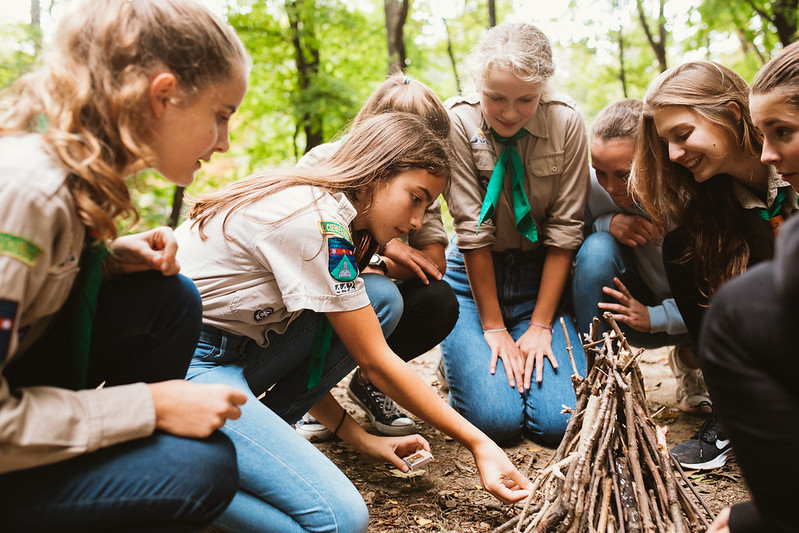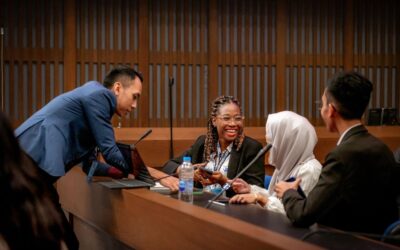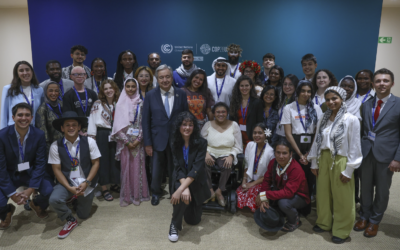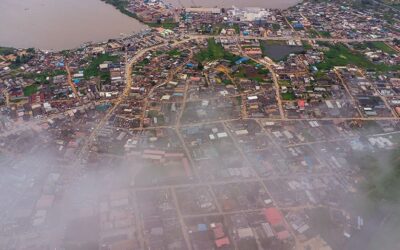Here’s why you should know about Non-formal Education
It was the middle of the night when I woke up to someone shaking my tent. With sleepy eyes I got up, put on a sweater, my scout shirt and neckerchief and felt a warm summer breeze stepping out under the starry sky.
It was the middle of August and we were camping on a small island in the middle of the Danube river in Hungary. Whispers and hurried steps filled the peaceful night. Some of the Scout leaders started walking ahead with flares in their hands, while the younger ones followed the dark path with excitement.
After a short hike through the forest we arrived at the river and our journey continued in some kayaks. The flares´ reflections on the water were guiding us in silence, until we reached the shore again.
Another little walk through the forest later we started gathering in a circle on a clearing. The ceremony in which the young Scouts would make their Scout Promise was about to start as my gaze followed the trees up to the stars shining bright in the sky. These Scouts maybe had not realized yet, but that night they would become part of a global community of more than 57 million Scouts, who had all once made their Scout Promise, committing to live by the Scout laws and to always put others before themselves.
Along their Scouting journey, they would not only embark on hundreds of adventures, but also be equipped with the knowledge, skills and values needed to master the challenges they face and grow into helpful and kind people ready to create a better world.
I have been able to learn so much through Scouting and have seen my fellow Scouts thrive and take active roles in contributing to positive change in their communities. The ceremony that night reminded me of the importance of Scouting for young people’s development and how lucky we are to get to learn so much, simply by doing and playing.
This kind of education that is taking place in Scouting and many other organizations and groups is called Non-Formal Education (NFE). In fact, non-formal education is all around us: being part of a sports team, volunteering, playing an instrument or in theater, or being part of some other youth or community group.
All of these environments provide non-formal learning opportunities for young people. We are confronted with NFE and its outcomes everyday, yet many are missing the correct term to describe it. So here is an overview of what NFE actually is and why it is a critical part of education in today’s world.
First, lets distinguish between the different forms of education:
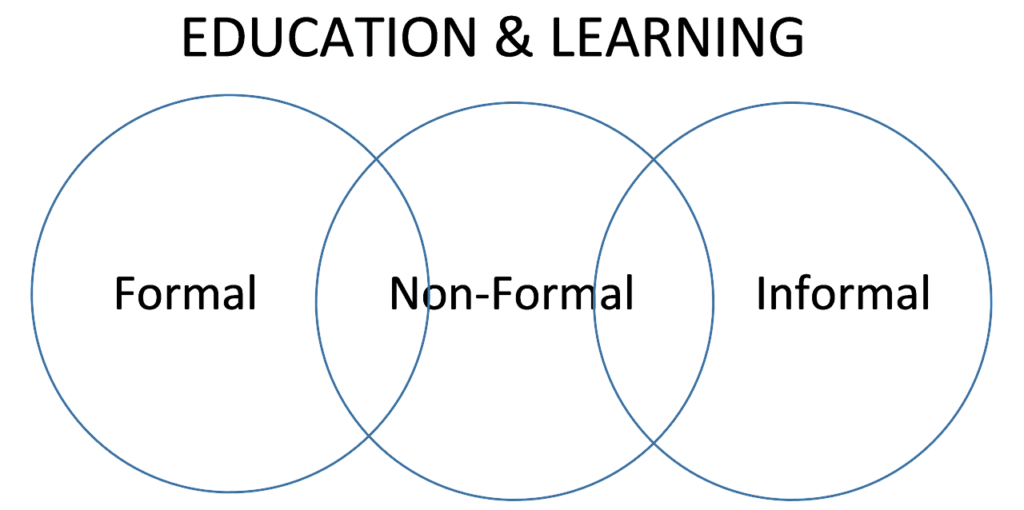
Formal education: Primary, secondary and tertiary education, at the end of which a recognised certification, diploma, degree can be achieved.
Informal education: What we learn through everyday situations and interactions. Like how to build friendships or to lock the door when leaving home, for example.
Non-formal education: Structured programmes outside the formal educational curriculum that are institutionalized and organized by an educational provider. These can be youth organizations, NGOs, sports teams and other groups people voluntarily join. NFE takes place by engaging in projects, discussions and creative or athletic activities together, playing games or going on trips, for example.
These are some characteristics of non-formal education:
- Voluntary participation
- Group context and peer-to-peer learning
- Learner centered
- Experiential learning: real life experiences, for example in nature or the community
- Holistic learning: learners´ cognitive, emotional and physical development is considered
- Value based: democracy, human rights, social inclusion
- Social action: contributing to speaking out and taking action around community challenges and civic participation
NFE is an addition or alternative to formal education and should be a part of every holistic and inclusive education system. In the face of globalization and increased social and ecological pressures, NFE programmes around the world are excelling at promoting young people’s personal development and equipping them with the knowledge and skills needed to take an active role in solving problems globally and locally. Besides fostering soft and life skills that are critical in the 21st century, NFE also aims to guarantee access to education for all, especially where formal education is not available to everyone.
These are some reasons why non-formal education is critical:
Alternative to formal education
In many communities children and youth do not have access to formal education. May that be for reasons of poverty, infrastructure or discrimination – denied access to quality education inhibits personal development and future employment. NFE is taking place all around the world, also in communities where formal educational opportunities are limited or unavailable. In such cases non-formal learning ensures the right to education for all through alternative quality opportunities. Particularly in humanitarian settings, NFE is crucial in providing educational opportunities.
Soft skills and life skills
Life skills help people manage their personal, work and social life in ways that bring them happiness and success. They include empathy, resilience, stress-management, problem-solving, creativity, decision-making or communication, for example, all of which are fostered through NFE. Soft skills are similar, although usually related to a work context. Such competencies tend to receive little attention in formal educational settings which are set out to complete strict curricula. Participation in NFE can add immense value in this regard.
Personal development
Without any doubt, non-formal education has a critical impact on one’s personal development. By engaging in a group, volunteering, playing, learning and overcoming challenges together, individuals who participate in NFE are naturally building their character and developing values that help them find self-fulfilment and develop into more cooperative, confident and conscientious people.
Youth-employment
Additionally to fostering personal development and that of soft and life skills, non-formal education also contributes to tackling the global issue of youth-unemployment. In today’s modern world of work, formal education is often not sufficient to enable young people to thrive in their professional lives. After completing formal education there is often a skills mismatch between what has been learned in theory and what is expected on the job. NFE bridges this gap by equipping young people with adaptable life and soft skills. Ultimately, these are often decisive for successful employment.
Contribution to sustainable development
NFE is crucial in supporting young people to become autonomous, responsible and committed global citizens, ready to tackle the challenges of today and tomorrow. It empowers them to become resilient, foster their talents and prepares them to cope with social and ecological changes. Not only does NFE foster individuals´ development, it has far bigger impacts. It embraces diversity and forwards gender equality by being inclusive of girls and young women who are often left behind. Further, by stimulating youth-employment, it can contribute to reduced poverty and income inequality. Last but not least, it allows young people to engage in a great variety of activities that contribute towards the United Nations´ Sustainable Development Goals and, ultimately, a better world.
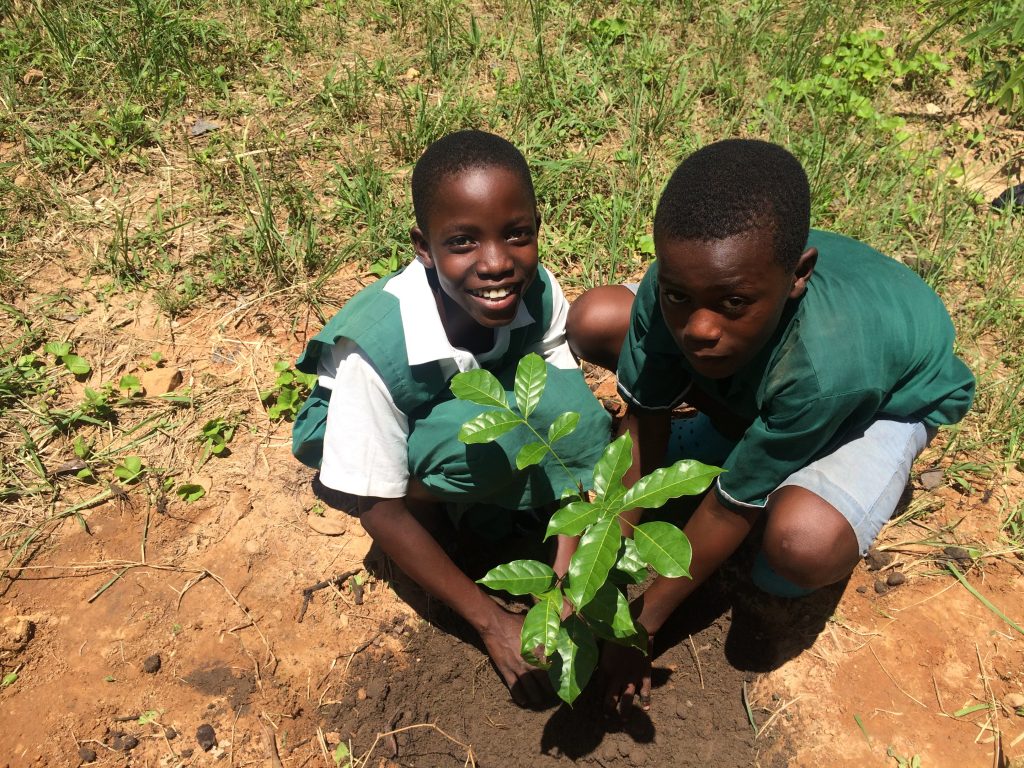
Aware of the value of NFE, in 2019, the World Non-Formal Education Forum was convened by the World Organization of the Scout Movement, UNICEF, UNFPA and the Office of the Secretary General’s Envoy on Youth in collaboration with the Big 6 Youth Organizations. During the forum, high-level stakeholders discussed the importance and future of NFE and agreed that “actions [are] needed to advance NFE as a powerful vehicle for the development of children and youth, and their role as active global citizens” (Rio Declaration on Non-Formal Education, 2019, p.1). The Rio Declaration on Non-Formal Education summarizes the outcomes of the event (available under this link: https://worldnfeforum.com/declaration/).
The World Non-Formal Education Forum was a seminal event that put NFE in the center of discussion among stakeholders. Today NFE providers are reaching hundreds of millions of young people around the world and having great impact.
In September 2022 the United Nations General Assembly (UNGA) convened the Transforming Education Summit in New York City in response to the global crisis of education. It was a space for global dialogue on what actions are needed to reverse the slide on progress towards SDG4 and to reimagine the future of education systems. Especially owing to the presence and efforts of some young people and NFE advocates who attended the summit, NFE was brought to the agenda: it was part of discussions and even included in official outcomes documents.
The Transforming Education Summit showed that NFE is becoming part of the political agenda on education on the one hand, but that on the other hand, it still has a long way to go from being mentioned at side events to receiving the spotlight it deserves on the main stage.
To achieve that, this is what we need to globally empower NFE:
Recognition
Systematic support from governments, ministries and organizations is necessary to further develop NFE practices and increase the reach of non-formal education providers. To achieve this NFE must, in the first place, be recognized by formal institutions. Only when it is officially recognized as an indispensable and complementary to formal education, will systematic structural and financial support be possible.
Funding
As for any kind of education, resources are needed to ensure availability and quality. Often NFE providers work on a voluntary basis and participation in activities is free of charge/very affordable, which means that providers need external sources of financial input. Donations are rarely sufficient to ensure financial security and also bear the risk of creating dependencies. Systematic funding by governments and other institutions is indispensable for securing the persistence and sustainable development of non-formal education programmes.
Popularization
We have established that NFE is a highly valuable addition to formal learning, if not even essential by itself. Yet, many don’t even know about the existence of non-formal education. To enable more young people to profit from non-formal education, the term itself has to become popularized and non-formal educational opportunities and providers more visible.
Popularization is also the first step towards achieving more recognition and funding bringing NFE on the agenda.
This is exactly the challenge we are taking on in this blog series. Our aim is to bring NFE closer to the public and uncover the people and organizations that stand behind it. In particular, we will highlight how exactly NFE is contributing to gender equality, fighting poverty, protecting nature and forwarding sustainable development in other areas. In the next couple of months we will showcase pioneering non-formal education programmes from around the globe that enable young people to stand at the forefront of making our world a better place.
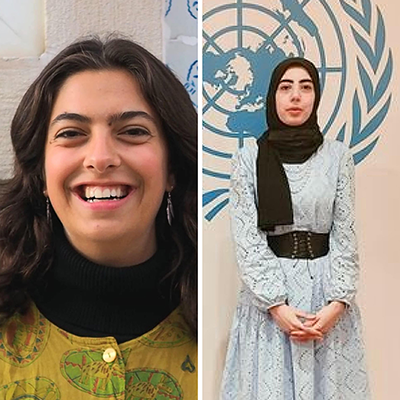
Authors
Kinga Szalaba is a student and youth representative of the World Organization of the Scout Movement.
Age: 18-24 // Country: Hungary
Yasmein Abdelghany is a Researcher, community organizer and content creator.
Age: 25-29 // Country: Egypt
